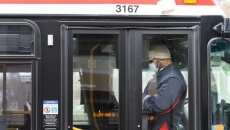A doctor who treats addiction at a clinic specifically for South Asian patients says Canada's new guidance on alcohol bolsters his efforts to convey the message about associated harms to a community that is at higher risk for conditions such as heart disease.
"I'm really happy to finally hear that there is support from objective guidelines for the information that we already knew," said Dr. Parm Brar, who works at the Roshni Clinic in Surrey, B.C., which opened in 2017 and provides services in Punjabi and Hindi.
"This is something that we can use as part of our resources as far as being able to say to people, 'Well, look, there's this objective evidence for this, that it's harming you,'" Brar said of updated guidance by the Canadian Centre on Substance Use and Addiction.
The CCSA overhauled recommendations on alcohol use this month, saying no amount of booze is safe and that more than seven standard drinks per week puts people at higher risk of cancer and heart disease.
That's a drastic change from its guidelines in 2011, when it said men could safely consume 15 drinks per week while women could have 10 drinks.
The CCSA did not provide suggestions on how to reach specific communities with its messaging, but health workers say they hope to address issues such as language while providing culturally sensitive information to the South Asian community as they try to convey that just two drinks per week are now considered low risk.
Brar, who is also a physician in the emergency room of Surrey Memorial Hospital, said South Asians, which make up a large proportion of the population in the region, sometimes address the issue as a family, accompanying relatives whose alcohol consumption starts to interfere with their daily lives.
Those who show up or are referred by their family doctor to Roshni, which means light in Hindi, are typically in the grip of an addiction to alcohol and often already at high risk of complications including liver and heart disease, Brar said.
"We know that South Asians that don't drink alcohol are at high risk of cardiac disease. It's just the way the physiology and the biology work in our South Asian population," he said.
"The challenge is that alcohol is so entrenched in our culture, that it's almost made to feel like it's not a harmful substance," Brar said of the prevalence of alcohol at some social gatherings.
"We know it's a carcinogen, we know it's terrible for your liver and your heart. It's so well intertwined within our culture that it's going to take time to detach," he said.
"I think this is a step in the right direction," Brar said of pointing people to the updated guidance, which emphasize health risk at higher consumption levels for all populations.
Baldev Mutta, CEO of Punjabi Community Health Services, which operates in the Ontario cities of Brampton and Mississauga, said the CCSA's guidance is prompting him to reconsider the non-profit's harm-reduction model in favour of abstinence while still providing counselling for those who choose to cut back or are dealing with addiction.
"We are now debating whether PCHS as an organization should take a position that, 'Look, no drinking is safe. These are the consequences of drinking.' These are the discussions we are having internally."
Mutta said he's "struggling" with how to communicate why the updated guidance advises that up to two drinks a week, instead of two drinks per day, as previously recommended, are now considered low risk, based on the latest research evidence.
"All of this leaves kind of a complex situation for me. How do we make sense of this from a bigger perspective?" he said of how a new approach will be perceived as plans will soon be underway to start a new education and awareness campaign in April.
He said alcohol consumption among Sikh men in particular is a growing concern and contradicts the religion's prohibition against addictive substances.
"It's very interesting that people who follow the religion refuse to smoke because smoking is also prohibited in the Sikh religion. But it's equally forbidden to drink and yet Sikhs drink."
He said significant use of alcohol among Sikhs has roots in India's colonial history when a large number of Punjabi men were in the British army and participated in the custom of officers drinking in the mess hall.
"Every soldier was allowed to purchase two bottles of rum every month. Even after retirement, they could go to a canteen and on a subsidized rate they could purchase two bottles of rum."
Former soldiers continued the tradition of drinking in the evening at home in their villages, he said, adding alcohol was introduced at weddings in the 1950s before becoming a regular part of various celebrations.
"We have a problem of drinking excessively. It is accepted by the culture. It is part of every celebration, house-buying, weddings, birthday parties, get-togethers, business meetings."
Mutta said there's a need for research into alcohol use among the vulnerable South Asian community in order to better understand specific barriers and improve access to treatment.
A review of limited literature related to alcohol use disorder among people of South Asian descent in Canada and the United States, published in 2018 in the online Journal of Ethnicity in Substance Abuse, says that group may struggle to receive care despite increased morbidity.
The review, led by Dr. Nitasha Puri, now a clinician researcher at the BC Centre on Substance Use, says immigrant, refugee and racialized populations have a lower participation in health promotion, prevention and services compared with others and that barriers may include language and stigma.
"Given the uniquely high risk of alcohol use issues and morbidity among South Asians, it is clear that a more focused and nuanced understanding of (alcohol use disorder) treatment in this (population) is necessary," says the review, which notes no North American studies focus specifically on South Asians in alcohol treatment settings.






